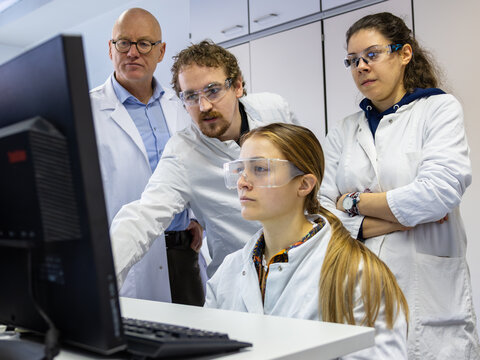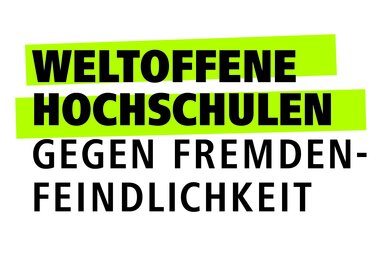
We help shape socially relevant issues
At Furtwangen University, we see ourselves not only as an educational and research institution, we also take our social mission very seriously. Imparting knowledge and values is what drives us and permeates all areas of our university life.
Living diversity
HFU is firmly committed to democracy and freedom. Our university should be a place of encounter, tolerance and open-minded and respectful cooperation. Furtwangen University stands for equal opportunities and diversity. We value our diverse community and communicate this to the outside world.
We oppose all forms of discrimination and misanthropy. We act decisively to uphold and protect the rights and dignity of every human being. Social responsibility, diversity and internationality characterise our HFU!

Internationality is our hallmark
HFU GlobalOpenness and tolerance
Furtwangen University is committed to diversity and tolerance. We are committed to equal opportunities for men and women, to equality between different lifestyles and against discrimination of any kind. At Furtwangen University, we have committed ourselves in our mission statement to giving special consideration to these principles and have anchored them in various areas. Internal link opens in the same window:Diversity is important to us.
Family-friendly university
The university aims to create working and study conditions for students and employees that enable a successful work-life balance. In doing so, HFU refers to an open definition of family, which describes a generational network in which people stand up for each other. This includes step, foster and adoptive relationships as well as same-sex partnerships. Our university thrives on its family atmosphere and families in particular should benefit from this. With this in mind, we try to create and improve framework conditions and structures.
Furtwangen University has been certified as a family-friendly university since 2008 and was re-audited and recognised in 2011. In 2014, Furtwangen University signed the "Familie in der Hochschule" charter and is thus a member of the Best Practice Club of family-friendly universities in Germany. The charter is a programme of the Robert Bosch Foundation and the Federal Government Commissioner for the New Federal States in cooperation with the Center for Higher Education Development (CHE).
Sustainability
![[Translate to English:] Man sieht eine Auflistung der Sustainable Developmment G](https://www.hs-furtwangen.de/fileadmin/_processed_/e/3/csm_E_2018_SDG_Poster_without_UN_emblem_Letter-US_60e70f0228.jpg)
Sustainable development is firmly anchored at Furtwangen University and is practiced in teaching, research, transfer and university operations. All of our faculties have firmly anchored sustainability issues in their structures and courses, and sustainability is also an important part of HFU's mission statement in the area of “Social Responsibility and Securing the Future”.
We see sustainability as a mission.
Climate Protection
Climate protection is an important and firmly anchored component of Furtwangen University. HFU coordinates the exchange between universities. In addition, our HFU Climate Protection Committee is committed to promoting the topic at HFU and beyond.
Internal link opens in the same window:Further information on climate protection at HFU
Quality
Quality Management at Furtwangen University
![[Translate to English:] Eine Infografik, die das Vier-Säulen Modell näher aufsch](https://www.hs-furtwangen.de/fileadmin/_processed_/4/6/csm_Vier-Saeulen-Modell_des_Qualitaetsmanagementsystems_der_HFU_9aa332526f.png)
As one of the leading universities in Germany, HFU is also characterised by its leading position in teaching. The academically sound, practice-oriented and innovative Internal link opens in the same window:education and training at the highest level of quality creates attractive learning conditions for students and a supportive environment for teaching staff. HFU has established a comprehensive quality management system based on four pillars to ensure and improve the quality of studies and teaching in the long term.
Pillar 1: Commitment to quality
The constant pursuit of the highest quality guides the actions of all members of Furtwangen University. In order to define the direction and objectives, HFU has adopted a "Quality Vision" with the participation of the students. Together with the requirements of university law, these goals form the first of the four pillars of the quality management system (QMS) at HFU.
Quality vision
HFU is continuously expanding its traditionally good reputation as an innovative university with outstanding educational quality.
We design teaching and studies in such a way that students achieve the agreed learning objectives of the respective subject and degree programme. This includes the promotion of soft skills and methodological competence. Students are thus also equipped for further development in their fields of work. Our graduates are a positive advertisement for HFU:
- They are pillars of the regional economy and thus strengthen the region.
- They enjoy national recognition and are in demand.
- They are internationally employable.
The university achieves this in a teaching and learning environment with a familiar character and a distinctly constructive culture of discussion.
Pillar 2: Creating structures
![[Translate to English:] Eine farbige Auflistung der vier Regelkreise der Qualitä](https://www.hs-furtwangen.de/fileadmin/_processed_/d/1/csm_Vier_Regelkreise_der_Qualitaetssteuerung_der_HFU_5d4abf8279.png)
Structural quality, the second pillar of the QMS at HFU, is fundamental to all other forms of quality, as a functioning set of rules and developed resources create security for those involved and the results. The principle of subsidiarity is the guiding principle at HFU: the lowest level is responsible for quality, at which the respective measures can be planned and implemented. These levels are linked via "bottom-up reporting" and a "top-down information flow". This creates accountability and an agile system of quality control.
Partnership
What is special about HFU – together with two partner universities, a quality advisory board is to be set up for each of the three universities. These will be made up of external experts and thus support the QMS from an expert perspective. The quality advisory board will be set up as soon as approval has been granted by the Accreditation Council.
QM Board
All committees at the university are included in these control loops. The Quality Management Board (QM Board) is of decisive importance for the overall structure within the university. This is an advisory Senate committee and ensures that HFU's quality management system (QMS) functions in accordance with the accreditation regulations set out in the StAkkrVO and further develops the QMS. It will be joined by the externally staffed Quality Advisory Board, which is to be established from 2020 following approval of an application to the Accreditation Council.
Pillar 3: Designing processes efficiently
![[Translate to English:] Farbige Übersicht der Prozesslandkarte der HFU](https://www.hs-furtwangen.de/fileadmin/_processed_/8/7/csm_Prozesslandkarte_HFU_a0c1bd88d5.png)
Process quality, the third pillar of the quality management system (QMS) at HFU, is the result of a precise but flexible definition of all processes at HFU. These are summarised in a process map; all main and sub-processes are modeled according to the rules of modern process management. As a special feature, Furtwangen University has set up technical support systems to help with the implementation of processes, such as FINQUAS, Furtwangen's information system for quality assurance.
Pillar 4: Ensuring results
Quality of results, the fourth pillar of the quality management system (QMS), represents the output of the overall system. A clear structure characterised by values and implementing the applicable university law with efficient processes at all levels results in a high quality of studies and teaching. Conversely, findings from the evaluation of studies and teaching have an impact on the other pillars of the QMS – a continuous improvement process.
Quantitative impact monitoring
- Teaching evaluation: Every course is regularly evaluated by the students. Teachers, course directors and faculties use the insights gained to further develop the course and the degree programme.
- Service evaluation: Students can submit their assessment of the service quality of the administration and central facilities in a regular survey. The administration and facilities use this to derive measures to improve service quality.
- Survey of graduates: How do graduates look back on their studies at HFU? How did they find employment? Answers to these questions are provided by former students in annual surveys. The results are extremely important for the adaptation of a practice-oriented academic degree program.
- Bonus/malus system: All students have a personal points account. This is used to manage studies in the interests of the students, as it enables rapid personal progress in their studies and comprehensive support services.
- Employee survey: Employees regularly look inwards and evaluate their work situation. This is an important management tool for the university in order to further develop cooperation and leadership within the university.
Qualitative impact monitoring
- Quality reports: The annual quality reports of the degree programmes are HFU's central reporting tool. They contain all important key figures of the degree programmes and the faculty's statement on the development of the degree programme. A university-wide quality report is compiled on this basis.
- Quality discussions: Annual discussions between the faculty and the Board of Executives on the existing range of courses serve to further develop studies and teaching. The faculties' quality reports are included here.
- Study commissions: The study commissions in all degree programmes make recommendations for the further development of the content and form of studies and are involved in the evaluation of teaching.
External evaluations
Furtwangen University wants to know: How do others see us? This is why HFU participates in third-party evaluations, rankings and certifications.
Here is a selection of Furtwangen's successes:
- HFU's degree programmes regularly receive top positions in rankings such as the CHE University Ranking.
- HFU is one of the universities of applied sciences with the most scientific publications in Baden-Württemberg (peer review journals).
- HFU has an above-average research income (third-party funding) among universities in Baden-Württemberg.
- HFU's continuing education programme was rated "GOOD" by Stiftung Warentest.
- HFU was the second university of its type in Germany to be awarded the coveted seal of system accreditation. This is based on its highly developed quality assurance system in the areas of study and teaching.
- The ERASMUS seal of quality documents the outstanding quality of support for international students at HFU.
- As one of the few universities in Germany, HFU's sustainability management has been awarded the EU Eco-Management and Audit Scheme (EMAS).
Equal opportunities
Furtwangen University is committed to diversity, openness and equal opportunities and rejects any form of discrimination. In order to bring this commitment to life, colleagues at HFU are involved in various internal and external networks.
You can find all the information you need in our Download file:equality plan.
Internationalisation
Internationality is an integral part of Furtwangen University's mission statement and its trademark − we live it!
You can find out more about our internationalisation strategy and our many worldwide partnerships on the Internal link opens in the same window:Global Networks page.
Health
Our health is our most valuable asset! That's why Furtwangen University has a strong focus on this topic. We train the health professionals of tomorrow and are constantly developing our range of courses in this area. Health is one of our main areas of research, and our research projects aim to find solutions to highly topical issues in this field.
But health is also important to us in our day-to-day work. That of our students and that of our employees. That's why the Corporate Health Management and the Health Steering Committee are a whole team dedicated to developing and offering new health services at HFU. Whether it's health days, exercise programmes for in-between classes or a new health app − we actively focus on the topic of health!
Internal link opens in the same window:Occupational health management at HFU
Your key contact
I'm happy to provide information on health at HFU!


